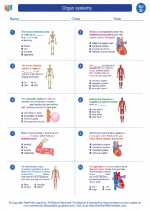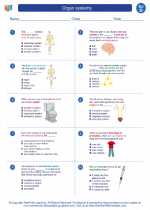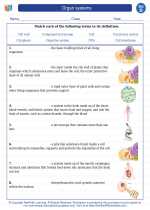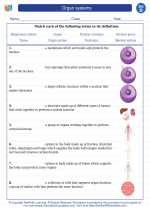Central Nervous System
The central nervous system (CNS) is the part of the nervous system that consists of the brain and spinal cord. It is responsible for processing and coordinating information received from the sensory organs and sending instructions to the rest of the body. The CNS plays a crucial role in controlling bodily functions and behaviors.
Structure of the Central Nervous System
The brain is the most complex organ in the human body and is divided into different regions, each responsible for specific functions such as motor control, sensory perception, and cognitive processes. The spinal cord, on the other hand, serves as a pathway for communication between the brain and the rest of the body, as well as controlling certain reflexes.
Functions of the Central Nervous System
- Processing sensory information
- Initiating motor responses
- Regulating internal body systems
- Controlling emotions and behavior
- Facilitating learning and memory
Study Guide
Here are a few key concepts to understand when studying the central nervous system:
- Anatomy: Learn about the different regions of the brain and their functions, as well as the structure and function of the spinal cord.
- Neurons: Understand the basic building blocks of the nervous system and how they communicate with each other.
- Brain Functions: Explore the role of the brain in controlling various bodily functions, emotions, and behavior.
- Spinal Cord: Study the importance of the spinal cord in transmitting signals between the brain and the body and its role in reflex actions.
- Disorders: Investigate common disorders and conditions that affect the central nervous system, such as stroke, multiple sclerosis, and Alzheimer's disease.
Understanding the central nervous system is essential for comprehending how the human body functions and responds to its environment. It is a fascinating and complex system that continues to intrigue scientists and researchers around the world.
[Central Nervous System] Related Worksheets and Study Guides:
.◂Science Worksheets and Study Guides Fourth Grade. Organ systems

 Worksheet/Answer key
Worksheet/Answer key
 Worksheet/Answer key
Worksheet/Answer key
 Worksheet/Answer key
Worksheet/Answer key
 Vocabulary/Answer key
Vocabulary/Answer key
 Vocabulary/Answer key
Vocabulary/Answer key
 Vocabulary/Answer key
Vocabulary/Answer key
 Vocabulary/Answer key
Vocabulary/Answer key
 Vocabulary/Answer key
Vocabulary/Answer key
